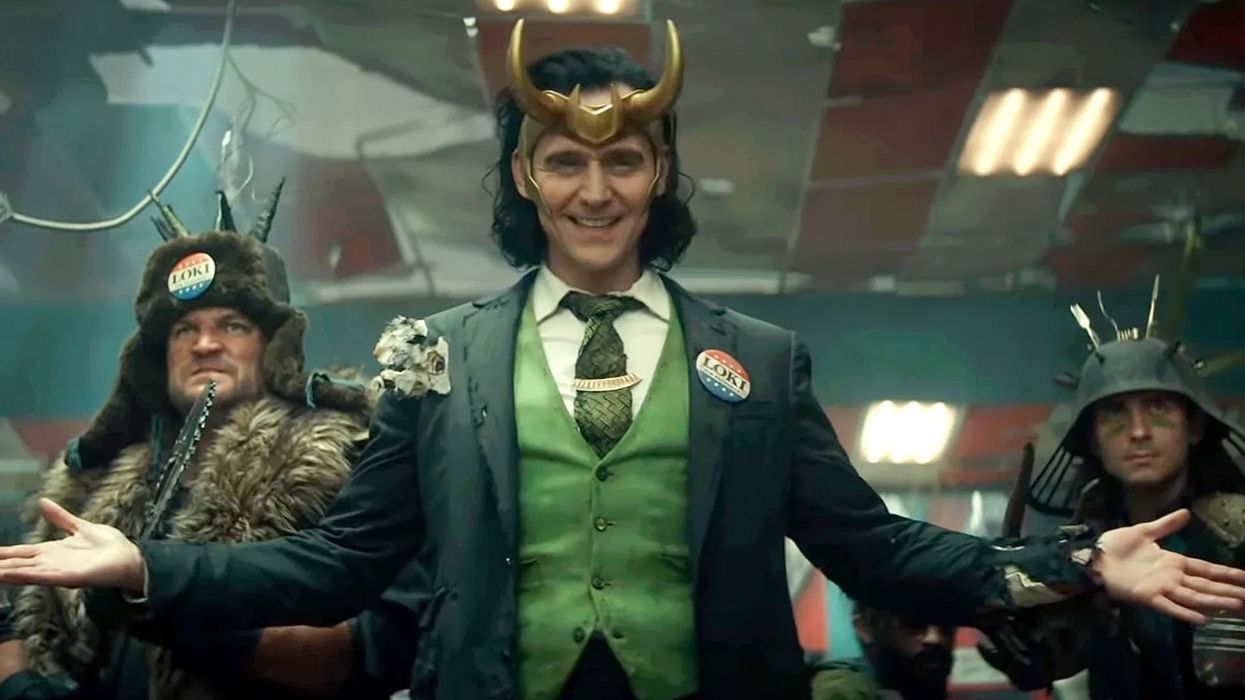Learn How ‘Loki’ Writer Michael Waldron Subverts the Villain Trope
Even in the midst of impending doom, Loki and Sylvie are there, hand-in-hand, accepting their newfound fates together.

Marvel's limited series, Loki, has proved once again that Marvel loves to switch it up on us. (Spoilers for the show follow!)
The show uses the concept of "variants," those who are a threat to a "sacred timeline," to explore the variety of stories one type of person could have or could potentially be. It's basically an exploration of alternate timelines and realities, something comic book stories love to feature.
Classic Loki (Richard E. Grant) shows that the trickster who alienates himself gets lonely, while Boastful Loki (DeObia Oparei) and the pack of Lokis like him fall back into the default setting of betraying anyone who cares for or about them. No matter which Loki we are looking at, we are seeing multiple sides that all resemble the same person.
No one in the MCU understands Loki (Tom Hiddleston) better than Sylvie (Sophia Di Martino), a female Loki variant who is on the hunt to destroy bureaucrats of the Time Variance Authority (TVA). Sylvie is a fantastic character in her own right, and her complex relationship with herself in the form of Hiddleston has made the character of Loki far more complex than any other character in the MCU.
Sylvie’s role has become a crucial element to Loki on a narrative and emotional level. She is a spiritual mirror that reveals details about Loki to himself and the audience that help both understand how the character is developing from his role in the first Avengers.
The writer for the show, Michael Waldron, told Den of Geek, “It’s a journey of self-reflection, literally and figuratively. In meeting Sylvie and then other versions of himself, [Loki is] having to look inward in a way that he never has before, and really ask the question, ‘Am I capable of change?’”

Character and theme
The idea of change is the front-running theme of the show, and the idea is pushed and challenged in each episode when Loki or a variant has the opportunity to betray someone and save themself. Although Sylvie and Loki have very different backstories, the two share a similar selfish mindset. For them, it is easier to focus on the task at hand rather than deal with their own traumas.
Marvel presents the idea of trauma in a multitude of different ways through its films and shows, but the trauma in Loki focuses on the self rather than the physical world.
If there is one thing that makes a Loki a Loki, it’s their inability to find acceptance for themselves. For Sylvie and Loki to have each other means that they are forced to look at the way they view themselves.
The nexus event (what the show calls a diversion from the sacred timeline) they caused happened because they learned how to have compassion for one another and themselves. Rather than accept the role they’ve been given, they are learning that they can change and better themselves just like any other person can.
Loki is telling a love story, and it’s fitting that Loki finding love with himself feels like a joke. The show isn’t shy to poke fun at Loki’s narcissism while still allowing space for him to be vulnerable in ways that Marvel hasn’t shown us before.
“Loki is a guy who thinks of himself as a villain,” Waldron says. “And here, he meets a version of himself that he doesn’t see that in... and then he can think of himself as something else.”
Loki’s and Sylvie’s route to self-acceptance and perhaps even love is an odd, slightly self-absorbed, and chaotic journey, but it doesn’t make it any less valid.

Complex characters
Stories like Loki’s can tell rich stories about complex characters through a unique lens because it plays on character’s tropes. As Marvel fans, we understand Loki, as a villain, is set up to lose in the end.
Loki solidifies this trope when Morbus (Owen Wilson) tells Loki that Lokis is destined to lose. By subverting the audience’s expectations of a character trope, the possibilities are endless to tell a more personable story.
“Our show is about a couple of Lokis trying to change [their destiny], trying to redefine what it means to be a Loki and figure that out for themselves," Waldron says.
With the series finale coming Thursday on Disney+, we shall see if Loki and Sylvie discover that they are more than a role assigned to them by the TVA or the clever writers' room for Loki. Either way, the accomplishment of reshaping and humanizing a character that debuted more than nine years ago is something to marvel at and take a few notes from.
Characters in our stories are ever-changing, and allowing them to grow into the person they need to be for themselves is a selfless act for the writer. Doing so will allow the story to branch into so many directions that were never thought about or considered, and could create a groundbreaking story that changes the screenwriting game.
Are you caught up with Loki yet? If so, let us know your thoughts about the show and the character's developments in the comments below!
Source: Den of Geek














































